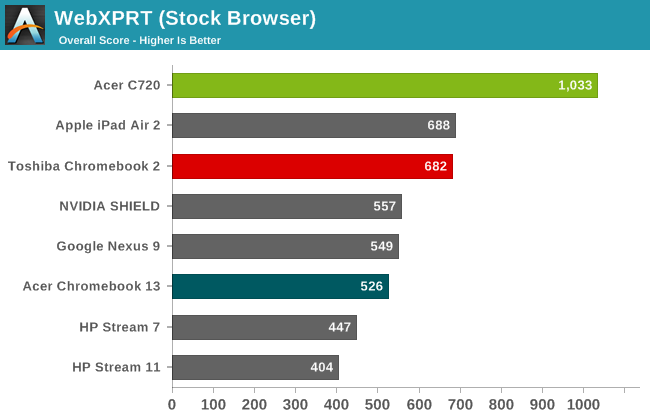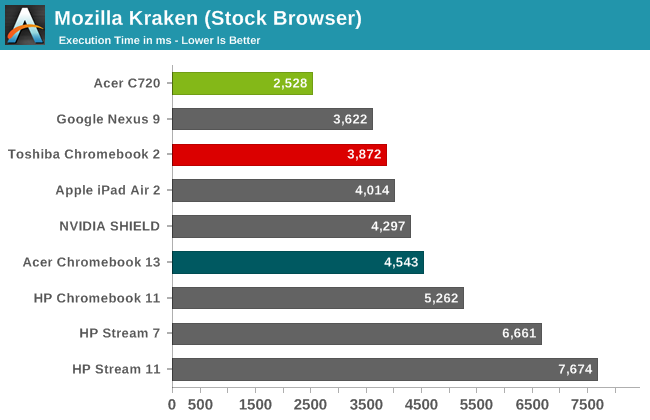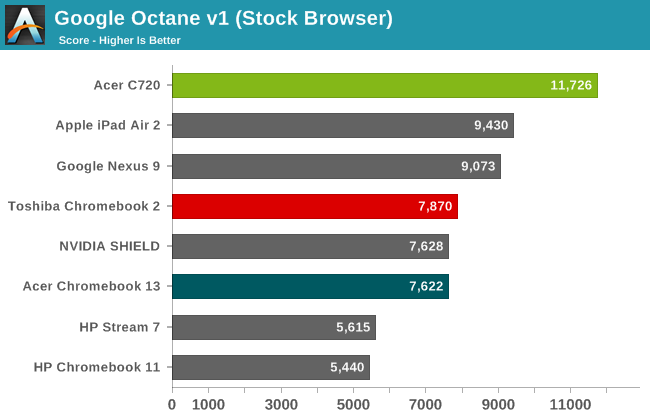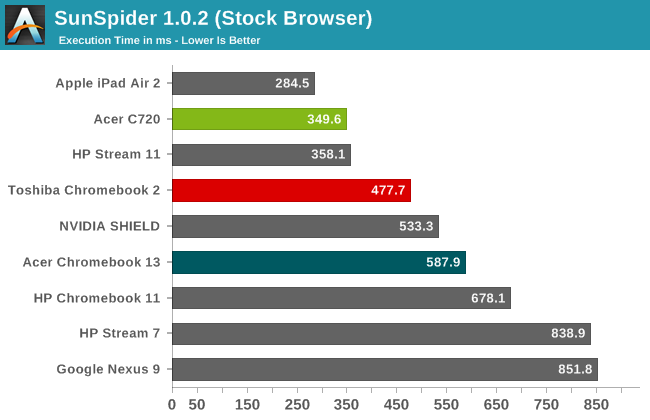Toshiba Chromebook 2: A Feast for the Eyes
by Jarred Walton on February 11, 2015 10:00 AM ESTToshiba Chromebook 2 Performance
After all the praise of the last page, this is the one area where the Toshiba Chromebook comes up short. Here I have to take some exception with Intel’s decision to brand some of the formerly Atom as Celeron, as even the older Sandy Bridge, Ivy Bridge, and Haswell Celerons could offer decent performance. Intel’s Atom has a well-deserved reputation for being merely “fast enough”, and it primarily goes up against ARM SoCs these days. However, while performance (at least on the CPU portion) is respectable compared to ARM, it’s a pretty sizeable step down from the Celeron 2955U, never mind the upcoming Broadwell-U Celeron 3205U. And if the CPU performance is somewhat questionable, the GPU results are downright poor. Here’s the performance of the Toshiba Chromebook 2 in numbers, keeping in mind that there really aren’t a lot of Chrome OS benchmarks available.




| Additional Performance Results | |||
| Acer C720 | Acer CB13 | Toshiba CB35 | |
| CrXPRT | 96 | 55 | 61 |
| CrXPRT Battery (Hours) | 8.52 | 9.9 | 7.58 |
| OORT Online (WebGL) | 3270 | 4010 | 1420 |
| Spacerocks (WebGL - FPS) | 18 | 30 | 11 |
| WiFi FTP Download (Mbps) | 100 | 115 | 175 |
The CPU of the N2840 is able to surpass most ARM processors (at least, those that we’ve tested) in terms of performance. The problem is that the GPU is quite a bit slower than the competition. Take NVIDIA’s Tegra K1 SoC, which pairs one of the fastest SoC GPUs with a respectable ARM-based CPU; by contrast, the N2840’s CPU is generally faster than the Tegra K1’s CPU, but the GPU ends up being substantially slower – less than half the performance by our numbers. For a browser-centric OS like Chrome OS, I’m not sure it matters all that much, but as we discussed earlier there are cases where graphics performance still matters – like YouTube 1080p60 content.
Of course, outside of 1080p60 and a few games, I continue to struggle to find a need for faster graphics performance on Chromebooks. If you have similar feelings the Atom N2840 should be a reasonable compromise. In Octane, Kraken, and SunSpider, the N2840 consistently beats the Tegra K1 and in some cases it even ties (roughly) Apple’s A8X. However, we still have to account for the Celeron 2955U that pretty much tops our performance charts – and that’s a nearly two years old processor that is going to be superseded shortly.
As it stands, performance from the Celeron N2840 is significantly lower than what we measured with Celeron 2955U, edging out the Tegra K1 but not by a lot. It’s certainly “fast enough”, just like the Acer Chromebook 13, but compared to the Acer C720 the performance gap is very noticeable. This is why I’m really looking forward to testing the upcoming Acer Chromebook 15 with a Celeron 3205U (or maybe even a Core i3) – performance even when just surfing the web can still matter, especially when viewing webpages like Google Drive.
Tangentially related to performance, it’s worth noting that the Toshiba Chromebook 2 includes 802.11ac WiFi, with a 2x2 spatial stream solution. Over the local network, I was able to copy files at up to 175 Mbps, which beats the Acer CB13’s 115 Mbps and the C720’s 100 Mbps. This testing however was done via FTP transfers to a local system, which may not be the best indication of maximum WiFi performance. It would be great if there was an easier way to connect to local Windows shares, but as far as I can tell that’s not an option.










66 Comments
View All Comments
nafhan - Wednesday, February 11, 2015 - link
I upload all my photos and videos straight to cloud storage from my phone. I don't bother with this dragging it across to my device thing you speak of. Old school right there...Plus, to discount your final point: there's a number of W8 based devices (mostly x86 tablets) with a similar amount of storage - from the same OEM's.
BackInAction - Wednesday, February 11, 2015 - link
I have the older Toshiba 13 CB at home. I have easily gone 3+ weeks without touching my desktop machine. But I don't do pix, audio or movie editing. I need zero local storage. The only reason I use my desktop is the once-a-month itch I get when I feel like doing a bit of gaming (cheap Steam games).The real crime is that they even make laptops with HDD anymore. That should be the premium upgrade, not the SSD. I would be willing to bet 95% of the PC (windows, MAC and 'linux' desktops) could get by with a 256GB SSD. Which is less than $80. But Apple, Dell, etc. make it a premium option only for stupid expensive PCs.
chlamchowder - Wednesday, February 11, 2015 - link
I wouldn't go so far as to call them pointless - you just need a really, really good internet connection.The intention is this: Jimmy loads the video into his Chromebook, which realizes it doesn't have enough internal storage left. So it uploads directly to the cloud through his dedicated low-latency gigabit connection, and it doesn't feel much slower than using internal storage. The pro is that when Jimmy gets a new Chromebook, he doesn't have to worry about spending hours copying files.
The problem is how hard it is to get a high speed internet connection. It's hard even at home, let alone when traveling (which kind of defeats the portable laptop form factor).
SM123456 - Saturday, February 14, 2015 - link
>>If this were windows it would be laughed out of the page even with 32GB of storage.<<Yes quite right if you were using Windows OS on the device - like for example the HP Stream 11 Windows netbooks which Microsoft has being trying to push as Chromebook killers - these have only 32GB local storage, which reduces to 17.5GB after you deduct the space used by the Windows with no apps installed. These crappy revisited netbooks have apparently flopped very badly.
However this limit does not apply to a Chromebook because, unlike Windows, the ChromeOS image is tiny and doesn't grow in size (in only contains the bare minimum required to run the provided hardware and the web browser, and you can't install programs or drivers on it). ChromeOS also does not use local storage at all except for user downloads and for caching data - all user data, apps etc. are created and stored in the cloud other than for what is temporarily cached locally (eg. local apps, data). Indeed Chromebooks will warn you that data in the local downloads directory may be subject to automatic deletion if space is required (you should use an SD card to store local files you do not want deleted).
Chromebooks just work completely differently to an old OS designed for the low end disconnected desktop era like Windows or an OS designed for high end connected network servers like Unix/Linux. This is how they are able to boot up fast, and run fast and responsively on low end hardware and limited disk/RAM space on which desktop Windows and full Linux installations run very slowly and very painfully.
AdmV0rl0n - Wednesday, February 11, 2015 - link
Lame. The whole industry needs a complete kicking. What we want is a cheap option, and a decent option. So for granny I don't give a crap, I'm happy with the low end, easy care device. What I want is a real laptop that runs chrome AND allows me to do what I want. So give me a Chromebook that has denet spec, and upgradable ram, disk, etc. ts been the heart of the PC industry for two decades, the fact Google and the tech companies can't do this is purely embarrasing.The google guys have added the capability to run linux in the OS. Thats awesome. But not on 16GB of space it's not.
I accept adding ram slots and disk slots adds to price. I accept a faster CPU does as well. *I* accept it has a higher price. Guess what. I have not yet bought a chromebook, and I'm not going to. Not unless this is fixed.
No prime OS and vendor should be happy failing to youtube in 2015. Its pathetic.
Shadowmaster625 - Wednesday, February 11, 2015 - link
Somethign seems to have changed starting with the haswell pentium/celeron U lines. They seem to be all vapor. I cant find one reasonably priced product containing any haswell pentium/celeron 15W chips.savagemike - Wednesday, February 11, 2015 - link
I'm not aware of any Haswell Pentium ever being offered in a ChromeOS device. Haswell Celerons were the standard for a while. Acer C720 and others of its era should still be readily available and at good prices. The screens on most of them aren't great though.Last year Intel really began pushing BayTrail chips in tablets and Chromebooks. Almost all the Chromebooks switched to it. Though I think all the Chromeboxes stayed using Haswell Celerons.
Now Broadwell is about to launch in the Celeron class chip and there is already information that at least some Chromebooks will be using it. Should be on sale in another month or two. I'm hoping Broadwell Celeron is the common chip this year as the Bay Trail stuff was slightly too much of a regeression in my book. The Haswell Celeron is a plucky little chip though and the Broadwell should be all the better.
Pneumothorax - Wednesday, February 11, 2015 - link
Why can't a single PC laptop maker make a laptop with this great screen with a DECENT CPU/iGPU, expandable HDD/SSD, and decent battery life at the $500 price point? Everything else still comes with the same $25 TN panels that should be all automatically thrown in the dumpster.jabber - Wednesday, February 11, 2015 - link
I bet the IPS option costs $25 and the TN $10.zodiacfml - Wednesday, February 11, 2015 - link
Awesome screen. Awesome WiFi. Yet, what to do with those with such an OS?I'd buy in a heartbeat with a big Celeron chip and Windows based for that price.